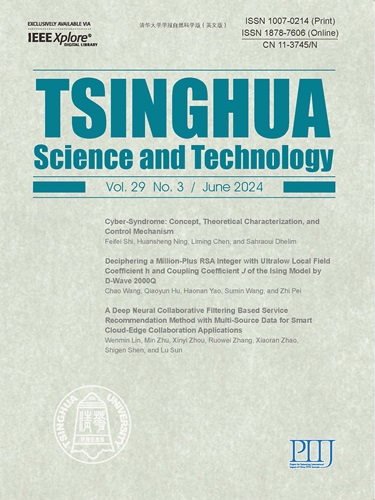A First Successful Factorization of RSA-2048 Integer by D-Wave Quantum Computer
IF 3.5
1区 计算机科学
Q1 Multidisciplinary
引用次数: 0
Abstract
Integer factorization, the core of the Rivest-Shamir-Adleman (RSA) attack, is an exciting but formidable challenge. As of this year, a group of researchers' latest quantum supremacy chip remains unavailable for cryptanalysis. Quantum annealing (QA) has a unique quantum tunneling advantage, which can escape local extremum in the exponential solution space, finding the global optimal solution with a higher probability. Consequently, we consider it an effective method for attacking cryptography. According to Origin Quantum Computing, QA computers are able to factor numbers several orders of magnitude larger than universal quantum computers. We try to transform the integer factorization problem in RSA attacks into a combinatorial optimization problem by using the QA algorithm of D-Wave quantum computer, and attack RSA-2048 which is composed of a class of special integers. The experiment factored this class of integers of size 2 2048 ,用d波量子计算机首次成功分解RSA-2048整数
整数分解是RSA (Rivest-Shamir-Adleman)攻击的核心,是一个令人兴奋但艰巨的挑战。截至今年,一组研究人员的最新量子霸权芯片仍无法用于密码分析。量子退火(QA)具有独特的量子隧穿优势,可以摆脱指数解空间中的局部极值,以更高的概率找到全局最优解。因此,我们认为它是一种有效的攻击密码的方法。根据Origin量子计算公司的说法,QA计算机能够比通用量子计算机大几个数量级。利用D-Wave量子计算机的QA算法,将RSA攻击中的整数分解问题转化为组合优化问题,并对由一类特殊整数组成的RSA-2048进行攻击。实验对这类大小为22048的整数进行因式分解,$N=p\乘以q$作为例子,文章在附录中给出了10次RSA-2048攻击的结果。这标志着D-Wave量子计算机首次成功分解RSA-2048,无论采用数学或量子技术,尽管处理的是特殊整数,但超过了加州州立大学的21061−1。实验验证了基于D-Wave的QA算法是一种有效的RSA攻击方法。
本文章由计算机程序翻译,如有差异,请以英文原文为准。
求助全文
约1分钟内获得全文
求助全文
来源期刊

Tsinghua Science and Technology
COMPUTER SCIENCE, INFORMATION SYSTEMSCOMPU-COMPUTER SCIENCE, SOFTWARE ENGINEERING
CiteScore
10.20
自引率
10.60%
发文量
2340
期刊介绍:
Tsinghua Science and Technology (Tsinghua Sci Technol) started publication in 1996. It is an international academic journal sponsored by Tsinghua University and is published bimonthly. This journal aims at presenting the up-to-date scientific achievements in computer science, electronic engineering, and other IT fields. Contributions all over the world are welcome.
 求助内容:
求助内容: 应助结果提醒方式:
应助结果提醒方式:


